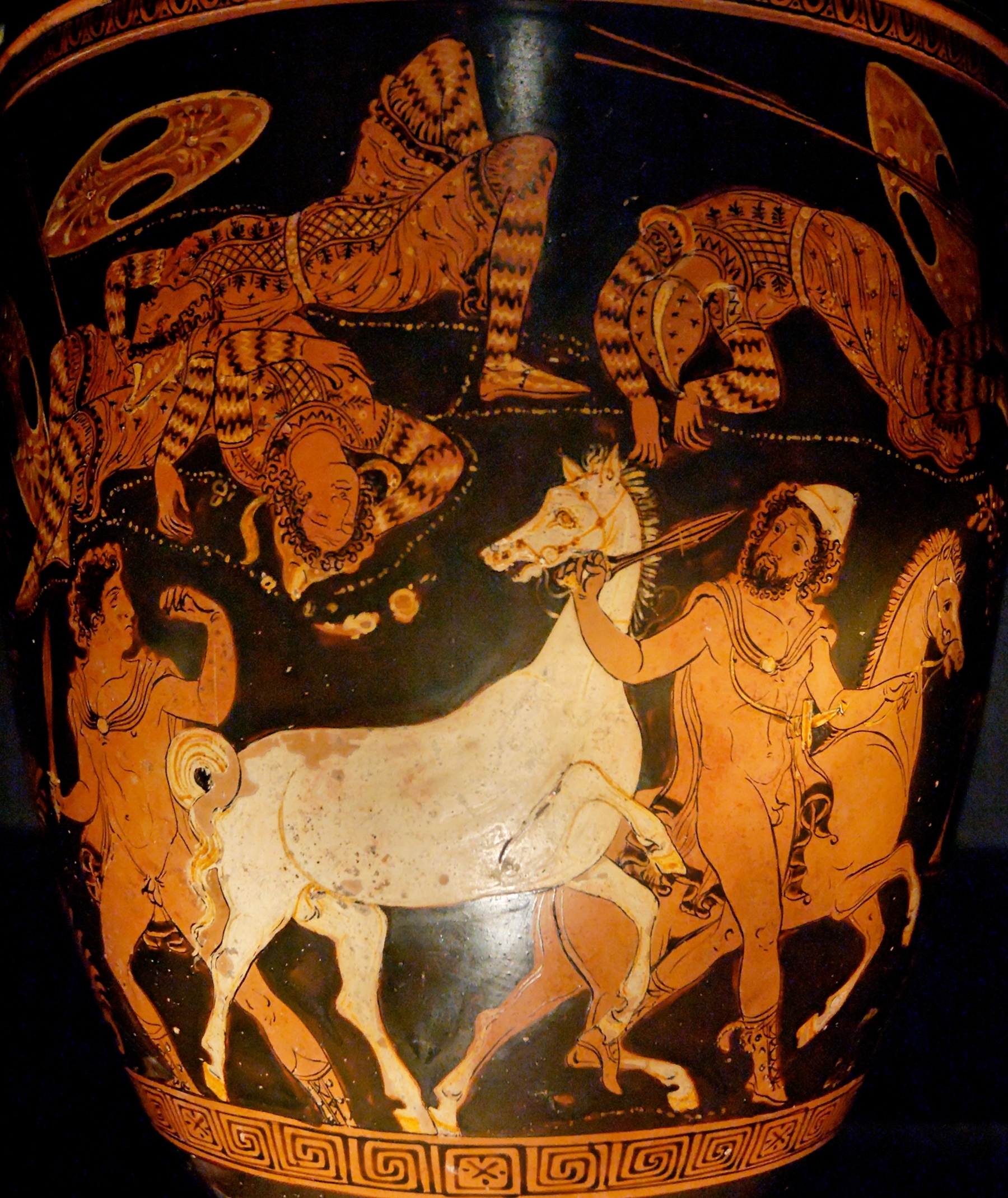- Rhesus (play)
Infobox_Play | name = Rhesus

caption = Odysseus and Diomedes stealing Rhesus' horses, red-figure situla by the Lycurgus Painter, ca. 360 BC
writer =Euripides (?)
chorus = Trojan Sentinels
characters =Odysseus Hector Diomedes Aeneas
ParisDolon Athena
Messenger
ShepherdMuse Rhesus
setting = Before Hector's tent at the gates of TroyRhesus (Lang-el|Ρήσος, "Rēsos"), possibly
350 BC , is transmitted among the plays ofEuripides , and was indeed believed to be genuinely Euripidean in the Hellenistic, Imperial, andByzantine periods. As early as the 17th century, however, the play's authenticity was cast into doubt, first byJoseph Scaliger and subsequently by others. Its authenticity was defended in a book-length study by William Ritchie (1964), but his conclusions were forcefully opposed by Eduard Fraenkel in a review that remains a classic of philological acumen to this day."Rhesus" takes place during the
Trojan War , on the night whenOdysseus andDiomedes sneak into the Trojan camp. This is the same event depicted in book 10 ofHomer 's the "Iliad ".tory
In the middle of the night Trojan guards on the lookout for suspicious enemy activity sight bright fires in the Greek camp. They promptly inform
Hector , who almost issues a general call to arms beforeAeneas makes him see how ill-advised this would be. Their best bet,Aeneas argues, would be to send someone to spy on the Greek camp and see what the enemy is up to.Dolon volunteers to spy on the Greeks in exchange forAchilles 's horses when the war is won.Hector accepts the deal and sends him out. Dolon leaves wearing the skin of a wolf, and plans on deceiving the Greeks by walking on all fours. Rhesus, the neighboring king ofThrace , arrives to assist the Trojans soon after Dolon sets out. Hector berates him for coming so many years late, but decides better late than never. Rhesus says he intended on coming in the beginning, but was sidetracked defending his own land from an attack byScythians .Meanwhile, on their way into the Trojan encampment, Odysseus and Diomedes run into Dolon and kill him. When they reach the encampment with the intention of killing
Hector ,Athena guides them to Rhesus' sleeping quarters instead, pointing out that they are not destined to kill Hector. Diomedes slays Rhesus and others while Odysseus takes his prized horses before making their escape. Rumors spread from Rhesus' men that it was an inside job, and that Hector was responsible. Hector arrives to cast blame on the sentinels for, due to the sly tactics, the guilty party could only be Odysseus. The mother of Rhesus, one of the ninemuse s, then arrives and lays blame on all those responsible: Odysseus, Diomedes, and Athena.This short play is most notable in comparison with the Iliad. The part with Dolon is pushed to the background, and much more is revealed about Rhesus and the reactions to his murder by the Trojans.
Controversy
According to
Gilbert Murray in his [http://www.perseus.tufts.edu/cgi-bin/ptext?doc=Perseus%3Atext%3A1999.01.0238 introduction to Rhesus] , passages from "Euripides'" "Rhesus" were quoted by early Alexandrian writers. However, there was some doubt shed on the authenticity of the work by ancient introductions. The first to fully dispute that "Rhesus" was a play by Euripides wasL. C. Valckenaer in his "Phoenissae" (1755) and "Diatribe in Euripidis deperditorum dramatum reliquias" (1767). ( [http://www.fordham.edu/halsall/ancient/eb11-euripides.html Ancient History Sourcebook] ) Most scholars have agreed with Valckenaer, but there are some who still believe the play to be by Euripides. Stylistic differences are one of the main arguments of the controversy. Murray, in dissent of the popular opinion, claims the differences in style could be attributed to a younger, less developed Euripides. Or the differences could be attributed to it being a reproduction by Euripides' son or other contemporary playwright.Translations
*
Edward P. Coleridge , 1891 - prose: [http://www.perseus.tufts.edu/cgi-bin/ptext?lookup=Eur.+Rh.+1 full text]
*Gilbert Murray , 1911 - verse: [http://www.perseus.tufts.edu/cgi-bin/ptext?doc=Perseus:text:1999.01.0238:line=1 full text]
*Arthur S. Way , 1912 - verse
*Richmond Lattimore , 1958 - verse
* unknown translator - verse: [http://classics.mit.edu/Euripides/rhesus.html full text]
Wikimedia Foundation. 2010.
